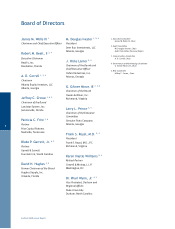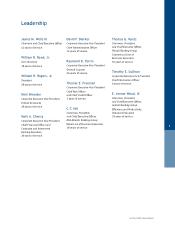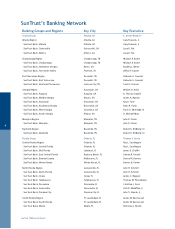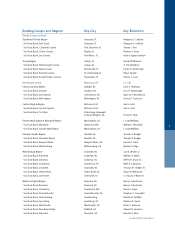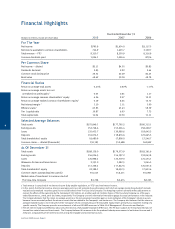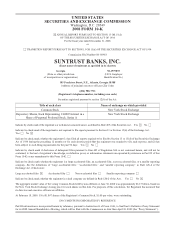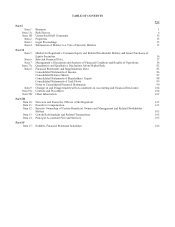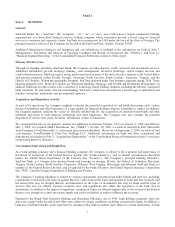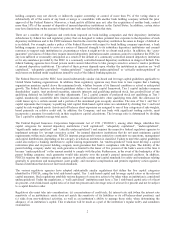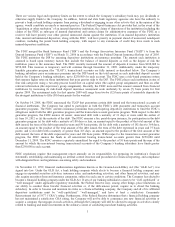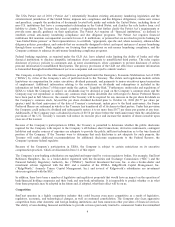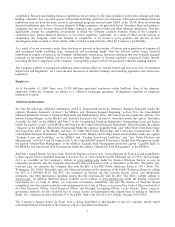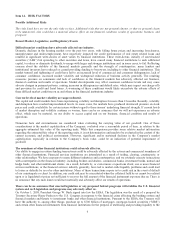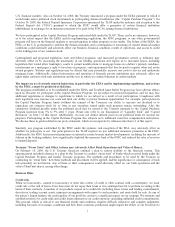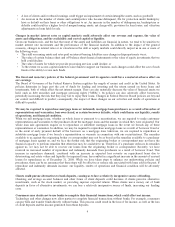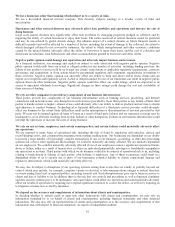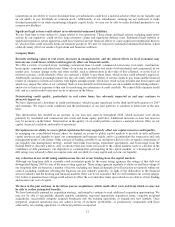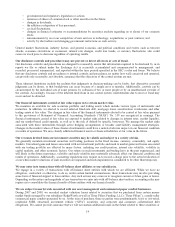SunTrust 2008 Annual Report Download - page 16
Download and view the complete annual report
Please find page 16 of the 2008 SunTrust annual report below. You can navigate through the pages in the report by either clicking on the pages listed below, or by using the keyword search tool below to find specific information within the annual report.The USA Patriot Act of 2001 (“Patriot Act”) substantially broadens existing anti-money laundering legislation and the
extraterritorial jurisdiction of the United States; imposes new compliance and due diligence obligations; creates new crimes
and penalties; compels the production of documents located both inside and outside the United States, including those of
non-U.S. institutions that have a correspondent relationship in the United States; and clarifies the safe harbor from civil
liability to clients. The Treasury has issued a number of regulations that further clarify the Patriot Act’s requirements or
provide more specific guidance on their application. The Patriot Act requires all “financial institutions,” as defined, to
establish certain anti-money laundering compliance and due diligence programs. The Patriot Act requires financial
institutions that maintain correspondent accounts for non-U.S. institutions, or persons that are involved in private banking for
“non-United States persons” or their representatives, to establish, “appropriate, specific and, where necessary, enhanced due
diligence policies, procedures, and controls that are reasonably designed to detect and report instances of money laundering
through those accounts.” Bank regulators are focusing their examinations on anti-money laundering compliance, and the
Company continues to enhance its anti-money laundering compliance programs.
Federal banking regulators, as required under the GLB Act, have adopted rules limiting the ability of banks and other
financial institutions to disclose nonpublic information about consumers to nonaffiliated third parties. The rules require
disclosure of privacy policies to consumers and, in some circumstances, allow consumers to prevent disclosure of certain
personal information to nonaffiliated third parties. The privacy provisions of the GLB Act affect how consumer information
is transmitted through diversified financial services companies and conveyed to outside vendors.
The Company is subject to the rules and regulations promulgated under the Emergency Economic Stabilization Act of 2008
(“EESA”) by virtue of the Company’s sale of preferred stock to the Treasury. The statute and regulations include certain
limitations on compensation for senior executives, dividend payments, and payments to senior executives upon termination
of employment. Additional information relating to the restrictions on dividends and redemptions is included in the
information set forth in Item 7 of this report under the caption, “Liquidity Risk.” Furthermore, under rules and regulations of
EESA to which the Company is subject, no dividends may be declared or paid on the Company’s common stock and the
Company may not repurchase or redeem any common stock unless dividends due with respect to Senior Preferred Shares
have been paid in full. Moreover, the consent of the Treasury will be required for any increase in the per share dividends on
the Company’s common stock, beyond the per share dividend declared prior to October 14, 2008 ($0.77 per share per
quarter) until the third anniversary of the date of Treasury’s investment; unless prior to the third anniversary, the Senior
Preferred Shares are redeemed in whole or the Treasury has transferred all of its shares to third parties. Under this provision
the Company could reduce its dividend and subsequently restore it to no more than $0.77 per share per quarter at any time.
Additionally, if the Company pays a dividend in excess of $0.54 per share before the tenth anniversary then the anti-dilution
provisions of the U.S. Treasury’s warrants will reduce its exercise price and increase the number of shares issuable upon
exercise of the warrant.
Because of the Company’s participation in EESA, the Treasury is permitted to determine whether the public disclosure
required for the Company with respect to the Company’s off-balance sheet transactions, derivative instruments, contingent
liabilities and similar sources of exposure are adequate to provide the public sufficient information as to the true financial
position of the Company. If the Treasury were to determine that such disclosure is not adequate for such purpose, the
Treasury will make additional recommendations for additional disclosure requirements to the Federal Reserve, the
Company’s primary federal regulator.
Because of the Company’s participation in EESA, the Company is subject to certain restrictions on its executive
compensation practices, which are discussed in Item 11 of this report.
The Company’s non-banking subsidiaries are regulated and supervised by various regulatory bodies. For example, SunTrust
Robinson Humphrey, Inc. is a broker-dealer registered with the Securities and Exchange Commission (“SEC”) and the
Financial Industry Regulatory Authority, Inc. (“FINRA”). SunTrust Investment Services, Inc. is also a broker-dealer and
investment adviser registered with the SEC and a member of the FINRA. RidgeWorth Capital Management, Inc.
(“RidgeWorth;” formerly Trusco Capital Management, Inc.) and several of Ridgeworth’s subsidiaries are investment
advisers registered with the SEC.
In addition, there have been a number of legislative and regulatory proposals that would have an impact on the operation of
bank/financial holding companies and their bank and non-bank subsidiaries. It is impossible to predict whether or in what
form these proposals may be adopted in the future and, if adopted, what their effect will be on us.
Competition
SunTrust operates in a highly competitive industry that could become even more competitive as a result of legislative,
regulatory, economic, and technological changes, as well as continued consolidation. The Company also faces aggressive
competition from other domestic and foreign lending institutions and from numerous other providers of financial services.
The ability of non-banking financial institutions to provide services previously limited to commercial banks has intensified
4


